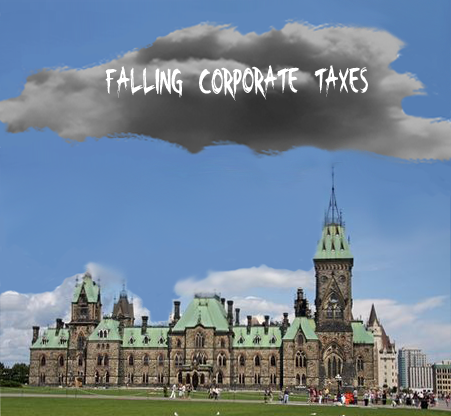3 Strange Signs Our Government Doesn’t Want Corporate Taxes

This statement still haunts me: “This government is not that interested in increasing the government’s capacity
to do anything about anything. They are not interested in raising more revenue.” It grabbed me when I first read it a month ago in the latest issue of Canadian Centre for Policy Alternatives (CCPA) “Monitor” magazine. The title of the article, “The Big Heist: Canada continues to let billions leave the country tax free,” should have been my first clue. The above quote was attributed to Dennis Howlett, executive director of Canadians for Tax Fairness. He was referring to the Canadian Conservative federal government led by Stephen Harper. I remember thinking when I read that quote, “Surely, that can’t be true!” After re-reading the article several times and doing some further research, I’m starting to agree with it. There are 3 strange signs that the Canadian government is not interested in more corporate tax revenue that would give it the “capacity to do anything about anything.”
1. It lowered corporate taxes
In 2000, the Canadian federal corporate tax rate was 28%; by 2014, it had dropped to 15%. Cuts to corporate taxes since 2007 are costing the Canadian federal government up to $13 billion per year in foregone revenue.
Businesses pay GST / HST taxes, just as other citizens do. In July 2006, the Harper federal government reduced the GST from 7% to 6%, with a corresponding drop in the HST from 15% to 14%. In January 2008, the government further reduced the GST from 6% to 5%, with a corresponding drop in the HST from 14% to 13%. The Parliamentary Budget Officer estimates that the 2% drop in GST / HST is costing the federal government $14 billion a year in lost tax revenue.
Taxes have morphed into a 4-letter word. Of course, no one wants to pay taxes, but they are our societal insurance premium. We expect governments to look after us, especially when emergencies arise, like hurricanes, forest fires, floods, earthquakes, medical emergencies, and economic recessions. In normal times, we expect governments to help provide quality education, healthcare, child care, elder care, communication and transportation infrastructure, utilities, water and sewage treatment facilities, waste management, and safety and security protection for all citizens. They can’t live up to our expectations without adequate funds.
Maybe the Stephen Harper-led Conservatives don’t want to avoid austerity measures that unravel social supports. Maybe they don’t want corporations to pay their fair share of taxes that sustain social and physical infrastructure. Strange.
2. It is not closing tax loopholes
On the other hand, maybe the corporate tax rate is irrelevant. Many corporations cleverly avoid paying most, if not all, of their income taxes anyway. Canadians for Tax Fairness estimate that Canadian corporations have $199 billion stashed in offshore tax havens, costing $7.8 billion per year in lost tax revenue. A 2014 Citizens for Tax Justice study found that 72% of Fortune 500 companies operated subsidiaries in tax haven jurisdictions in 2013. By booking profits to subsidiaries registered in tax havens, U.S.-based multinational corporations are able to avoid an estimated $90 billion in federal income taxes each year. Oxfam calculates that poor countries miss $100 billion in tax revenues each year because of this kind of corporate tax avoidance.
Why are governments around the world tolerating this? They could forbid tax havens if they wanted to. Why isn’t Canada aggressively following through on a 2013 G8 resolution to stop this travesty and why is it not promoting OECD efforts to do the same? On the contrary, Canadian governments and banks helped establish tax havens in the Caribbean after World War II, as documented in Alain Deneault’s book, Canada, A New Tax Haven. Canada pays lip service to G20 and OECD efforts, but behind the scenes it fights against any kind of proposal that would make it difficult for corporations to use tax havens.
The above-mentioned CCPA article notes that the federal government has cut about 3,000 positions from the Canada Revenue Agency (CRA), many of them tax auditors who were investigating complex tax avoidance accounting schemes. The Feds make feeble noises about going after these free-riders. The 2015 federal budget includes $83.5 million over the next five years for the CRA’s campaign to root out international tax evasion and aggressive tax avoidance. However, given that the budget was delivered just before an election and the downturn in the Canadian economy in the last six months, that promise may be in jeopardy.
My punch line in a blog last year, “A Wild and Crazy Corporate CSR Idea,” was “Pay your damn taxes!” The corollary for governments is, “Collect the damn taxes!” Accordingly, one of the goals in our Future-Fit Business Benchmark is that companies pay the right tax in the right place at the right time.
Why isn’t the government more aggressively pursuing corporate tax evaders and avoiders? Maybe they don’t want the resulting billions of dollars of additional revenue. Strange.
3. It is not cutting off perverse subsidies
Governments giveth; governments taketh away. In the case of the fossil fuel sector, governments giveth a lot. A 2015 International Monetary Fund (IMF) report pegged global energy subsidies at $2 trillion in 2013. In Canada, the externalized cost to government of the subsidies amounts to $34 billion per year. The IMF calls these subsidies to oil and gas companies “perverse subsidies” for four reasons:
- “They damage the environment, causing more premature deaths through local air pollution, exacerbating congestion and other adverse side effects of vehicle use, and increasing atmospheric greenhouse gas concentrations.
- They impose large fiscal costs, which need to be financed by some combination of higher public debt, higher tax burdens, and crowding out of potentially productive public spending (for example, on health, education, and infrastructure), all of which can be a drag on economic growth.
- They discourage needed investments in energy efficiency, renewables, and energy infrastructure, and increase the vulnerability of countries to volatile international energy prices.
- They are a highly inefficient way to provide support to low-income households since most of the benefits from energy subsidies are typically captured by rich households.”
What do perverse subsidies have to do with taxes? Many of the subsidies directly or indirectly lower corporate tax bills. G20 countries, including Canada, have made noble statements about their intent to “phase out” perverse subsidies. Nothing has changed. Given the above four factors, why not? Don’t governments want to avoid the negative impacts of the subsidies so that they can divert the money to more worthy social and environmental initiatives? Strange.
In total, the Harper-led Conservative federal government is deliberately and knowingly costing itself over $68 billion a year, mostly to the benefit of corporations.
- It has $13 billion less income a year because it lowered corporate tax rates.
- It has $14 billion less income a year because it lowered GST / HST tax rates.
- It has $7.8 billion less income a year because it allows – or abets? – corporate tax avoidance.
- It costs itself $34 billion a year from the impacts of its perverse subsidies to the non-renewable energy sector
Canada’s infrastructure deficit of crumbling roads and outdated water and sewage treatment is pegged at $171 billion. This backlog could be wiped out in less than three years with the above revenue, with resulting huge economic and job creating benefits. Why doesn’t the federal government want that smart economic stimulus? Strange.
So, what’s going on? Governments can’t contribute to a resilient and healthy society if their fiscal cupboards are bare. Is it time that we stepped back and had an adult conversation about the the role of government in Canadian society and how we collectively ensure that it has the financial capacity to fulfill its mission? My Canada requires governments to play a proactive role in the social, environmental, and economic well-being of our society. Why are we allowing that mission to become “mission impossible?”
Strange … and unacceptable.
Bob
Please feel free to add your comments and questions using the Comment link below. For email subscribers, please click here to visit my site and provide feedback.



